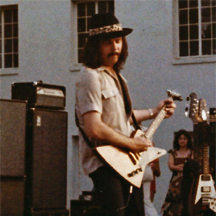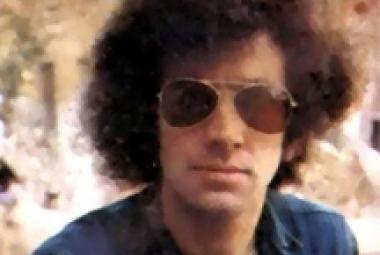GALEN NILES – Ultra/Homer
Galen Niles became the second lead guitarist in the Outcasts when Denny Turner joined the U. S. Army in 1966, and he played gigs with the band throughout that summer. Their last single, “1523 Blair” (released in January 1967) took the band in a different direction and is a nearly unique psychedelic rock song in that it is played at a furious pace. The song inspired the name of a future entry in the Under-Appreciated Rock Bands, a marvelous British band who released one album as Blair 1523.
In 1967, Galen Niles went back to college and met Chet Himes, who was dating the roommate of his girlfriend. They started jamming together with drummer Gary Crapster after Himes had been bugging Niles to start a band with him. Himes brought in a friend of his, Frank Coy. Much as the Beatles had done before – when each new member brought in the next – Frank added his friend Pat Cosgrove. The band practiced throughout the summer and became a good cover band with a 12-song repertoire that included “She’s Not There”, “Hush”, and “Land of 1,000 Dances”. After a while, the band dubbed themselves Homer, though Niles is not sure why.
After Homer started getting some better gigs, they pressed a 45 in mid-1968, with a Willie Nelson song “I Never Cared for You” backed with an original composition called “Dandelion Wine”. In a happy coincidence, Galen Niles’ father knew one of the morning DJ’s in San Antonio, on radio station KONO; goaded by copious donations of prime beef from the supermarket that he managed, “I Never Cared for You” started getting extensive radio play and peaked at #2 on the station’s playlist. The band began opening for national acts that came to the area, including Blood, Sweat and Tears, Vanilla Fudge, and Strawberry Alarm Clock.
Homer released an album called Grown in U.S.A. in 1970. Bandmembers by that time were Phil Bepko (vocals), Frank Coy (vocals), Galen Niles (lead guitar), Howard Gloor (lead, steel guitar), Gene Coleman (drums), and Chet Himes (bass). The music ranged from psychedelia to progressive rock, with instruments that included a Mellotron. Christopher Cross – who had several hits in the early 1980’s including “Sailing” and got the Grammy in 1980 for Best New Artist – also had some involvement with the album. (Christopher Cross was born on May 3, 1951, same as me!).
Homer was a popular band in the San Antonio area and hung in there until 1974; by that time, the line-up was Don Evans (vocals and drums), Chet Himes (bass), Van Wilks (guitar) and Galen Niles (guitar). Niles recalls: “Man, that was a smokin’ band then – the fact was, the only reason we had a vocalist was to take up some space between the guitar solos.”
Don Evans had earlier been in a band called the Water Brothers; fellow bandmember Robert Galindo (whose brother, Dan Galindo was the bass player for the 13th Floor Elevators) describes their music as “freestyle psychedelic blues/raga/fusion”. Chet Himes exited Homer in 1974 to become a recording engineer and worked with Christopher Cross as well as Ted Nugent; and Van Wilks left to start a solo career.
Ultra was formed out of the ashes of Homer when remaining members Galen Niles and Don Evans (who was strictly the vocalist in the new band) added Larry McGuffin (guitar), Scott Stephens (bass), and Tom Schleuning (drums). As a departure from the Homer sound, Ultra was an old-fashioned hard rock band with twin lead guitars trading solos and playing in harmony. Some might describe it as heavy metal, but I wouldn’t. Their sole release was a 5-song promotional EP with just 100 copies and a plain white cover.
Much as Homer had often done, Ultra was conceived as a touring band that would open for national acts, rather than playing in small clubs, and this was in keeping with their big sound. Galen Niles has mentioned as examples that they opened for Be-Bop Deluxe and Pat Travers. (Frequent touring was difficult financially though; often the roadies collected what little money remained after expenses were paid). Their sound was clashing with the growing popularity of disco and punk rock; and in fact, their most high-profile moment came when they opened for Sex Pistols at Randy’s Rodeo on January 8, 1978. Niles stated recently: “We most definitely had no business being on the same bill as the Sex Pistols, as we were not in any musical sense of the word a ‘punk’ outfit”.
(September 2011)















